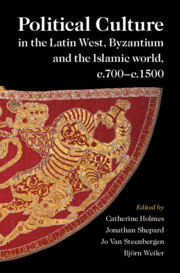 Political Culture in the Latin West, Byzantium and the Islamic World, c.700–c.1500
Political Culture in the Latin West, Byzantium and the Islamic World, c.700–c.1500 Expectations and Legitimisation
from Part III - Norms, Values and Their Propagation
Published online by Cambridge University Press: 11 August 2021
Norms in the Latin west, and the sources they drew upon, were surprisingly consistent: those in power were supposed to be just, pious, generous, humble and valiant; they were to protect the defenceless and heed advice from wise and prudent men; so said the Bible, the Church Fathers, authors of classical antiquity and a body of medieval writers. For real insight into medieval thinking about power, we should look at the debates around these norms and their interpretation, and who had the resources and capabilities to engage in these debates. Surplus resources and widening literacy helped new social groups to emerge, challenging traditional clerical elites and adapting, appropriating and ultimately transformed existing discourses. Social and linguistic diversification, shifts in how a realm was defined, and the emergence of new actors and audiences – all affected how power was conceived. This diversity led to a multiplicity of opinions on how shared norms were constructed and interpreted. An inherent flexibility and elusiveness, along with the vigorous and even violent debates they engendered, define the norms and values of power in the Latin west.
To save this book to your Kindle, first ensure [email protected] is added to your Approved Personal Document E-mail List under your Personal Document Settings on the Manage Your Content and Devices page of your Amazon account. Then enter the ‘name’ part of your Kindle email address below. Find out more about saving to your Kindle.
Note you can select to save to either the @free.kindle.com or @kindle.com variations. ‘@free.kindle.com’ emails are free but can only be saved to your device when it is connected to wi-fi. ‘@kindle.com’ emails can be delivered even when you are not connected to wi-fi, but note that service fees apply.
Find out more about the Kindle Personal Document Service.
To save content items to your account, please confirm that you agree to abide by our usage policies. If this is the first time you use this feature, you will be asked to authorise Cambridge Core to connect with your account. Find out more about saving content to Dropbox.
To save content items to your account, please confirm that you agree to abide by our usage policies. If this is the first time you use this feature, you will be asked to authorise Cambridge Core to connect with your account. Find out more about saving content to Google Drive.